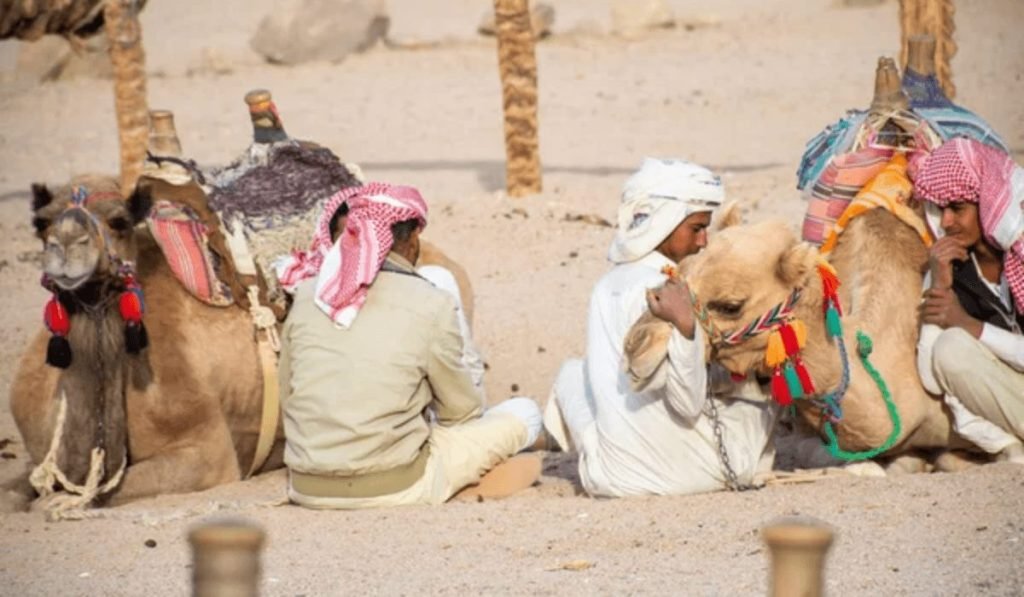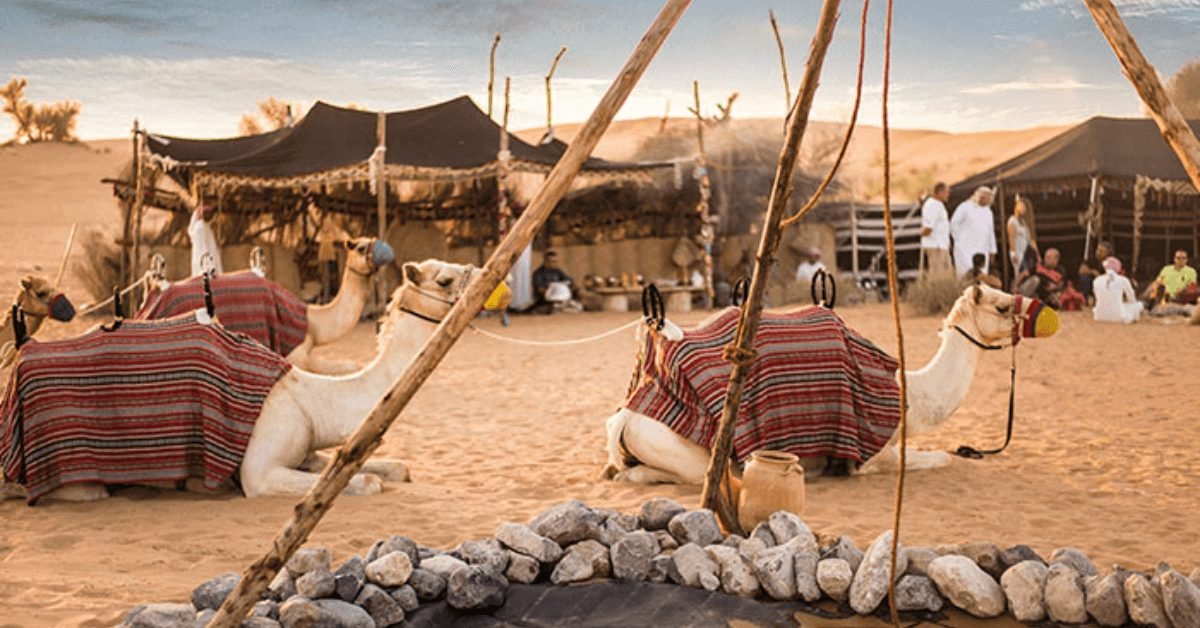In the bustling modern city of Dubai, amidst the towering skyscrapers and luxurious developments, lies a rich and vibrant culture that traces its roots back centuries: the Bedouin culture. The Bedouins, nomadic Arab tribes, have inhabited the Arabian Desert for generations, carrying with them a unique way of life that reflects their strong traditions, values, and connection to the desert. However, this ancient culture faces numerous challenges in the face of modernization and globalization. One way that Dubai is working to preserve and celebrate Bedouin culture is through the immersive experience of a Dubai Desert Safari.
Definition and Importance of Bedouin Culture

Before delving deeper, it is essential to understand the definition and significance of Bedouin culture. The Bedouins are traditionally nomadic tribes of Arab descent who have inhabited the Arabian Desert for thousands of years. Their culture is deeply rooted in their nomadic lifestyle, emphasizing hospitality, community, and a profound respect for nature. Bedouin traditions and values have been passed down through generations, creating a rich heritage that deserves preservation.
Threats to Bedouin Culture
Unfortunately, Bedouin culture faces numerous threats in the modern world. The rapid pace of urbanization and globalization has led to the erosion of traditional ways of life. Bedouin communities are increasingly affected by the influence of modern technologies, changing lifestyles, and outside influences. As a result, the preservation of Bedouin culture has become crucial to safeguarding a unique and invaluable piece of the region’s history and identity.
Dubai Desert Safari as a Means of Preservation
Dubai, known for its grandeur and ambition, has recognized the importance of preserving Bedouin culture and ensuring its survival for future generations. One of the ways it does so is through the Dubai Desert Safari, an experience that allows visitors to immerse themselves in Bedouin traditions, experience the vastness of the desert, and appreciate the profound connection between the Bedouins and their natural surroundings.
Understanding Bedouin Culture

To truly appreciate the significance of preserving Bedouin culture, it is essential to understand its roots, history, and traditions. By gaining insight into the Bedouin way of life, we can grasp why their cultural heritage is worth cherishing.
History and Traditions
Bedouin culture has a long and fascinating history, dating back to the early Arab tribes. The Bedouins’ nomadic lifestyle, based on camel herding and trading along ancient trade routes, allowed them to adapt and thrive in the harsh desert environment. Their traditions include intricate social structures, storytelling, poetry, and a deep respect for their tribal lineage.
Significance of the Desert
The desert holds immense importance in Bedouin culture. It is not merely a geographic landscape but a way of life. The Bedouins have developed unique skills to navigate and survive in the desert, such as camel riding, falconry, and traditional hunting techniques. The desert also serves as a spiritual retreat and a source of inspiration for Bedouin poetry, music, and folklore.
Challenges Faced by Bedouin Culture
Despite its resilience, Bedouin culture faces several challenges that threaten its preservation and continuity.
Modernization and Globalization
The rapid pace of modernization and globalization has led to increased urbanization and exposure to external influences. Bedouin communities are grappling with the impact of technology, Westernization, and changing societal values, which can erode traditional practices and values.
Urbanization and Changing Lifestyles
As cities expand and modern infrastructures develop, Bedouin communities face pressure to settle in urban areas, abandoning their nomadic lifestyle. This shift often leads to a loss of cultural identity and disconnection from their ancestral lands and customs.
Dubai Desert Safari: A Cultural Experience
Dubai has recognized the value of preserving Bedouin culture and has incorporated it into the tourism industry, offering visitors a unique opportunity to experience the Bedouin way of life firsthand.
Immersion in Bedouin Traditions
Dubai Desert Safaris provide visitors with a chance to immerse themselves in Bedouin traditions, including traditional clothing, henna painting, music, dance, and cuisine. Tourists can participate in camel rides, and falconry displays, and even spend a night in a Bedouin-style camp, allowing for an authentic and educational cultural experience.
Desert Safaris and Sustainability
Dubai’s commitment to sustainability ensures that Desert Safaris are conducted in an environmentally conscious manner. Measures are taken to minimize the ecological impact on the desert, preserve wildlife habitats, and raise awareness about the importance of conservation.
Promoting Bedouin Heritage and Traditions
Dubai actively promotes and supports initiatives that aim to preserve and promote Bedouin heritage and traditions.
Supporting Local Bedouin Communities
Efforts are made to support and empower local Bedouin communities by providing opportunities for education, healthcare, and sustainable livelihoods. This support ensures that Bedouins can maintain their cultural practices while adapting to the changing world.
Educational Initiatives and Awareness
Educational programs and awareness campaigns are essential in preserving Bedouin culture. Dubai invests in educational initiatives that teach locals and tourists about Bedouin traditions, history, and the importance of cultural preservation. Museums, cultural centers, and exhibitions play a significant role in this regard.
Integration of Bedouin Culture into Tourism
Dubai’s tourism industry actively incorporates Bedouin culture into its offerings, ensuring that visitors gain a genuine understanding and appreciation of Bedouin traditions. This integration creates economic opportunities for Bedouin communities and helps sustain their cultural heritage.
Conclusion
Preserving Bedouin culture is vital for maintaining the cultural diversity and heritage of the region. Through initiatives like the Dubai Desert Safari, Dubai is playing a significant role in ensuring the survival and celebration of Bedouin traditions. By immersing visitors in Bedouin culture, promoting sustainable practices, and supporting local communities, Dubai is actively working towards preserving and revitalizing Bedouin culture for generations to come.
FAQs
Is the Dubai Desert Safari suitable for all age groups?
Yes, the Dubai Desert Safari offers experiences suitable for all age groups. From camel rides to cultural performances, there is something for everyone to enjoy.
Are the Dubai Desert Safaris environmentally friendly?
Yes, Dubai places a strong emphasis on sustainability in Desert Safaris. Measures are taken to minimize the impact on the environment and preserve the natural habitats of the desert.
Can I learn about Bedouin traditions and history during a Desert Safari?
Absolutely! The Desert Safaris in Dubai provide educational opportunities to learn about Bedouin traditions, history, and cultural significance through interactive experiences and informative guides.
Are there options for overnight stays in Bedouin-style camps?
Yes, many Desert Safari packages offer overnight stays in Bedouin-style camps, allowing visitors to experience the authentic Bedouin lifestyle, including traditional food, music, and stargazing.
How can I support the preservation of Bedouin culture outside of the Desert Safari experience?
Supporting local Bedouin communities by purchasing handmade crafts and products, participating in cultural events and festivals, and spreading awareness about Bedouin traditions are meaningful ways to support the preservation of Bedouin culture beyond the Desert Safari.

